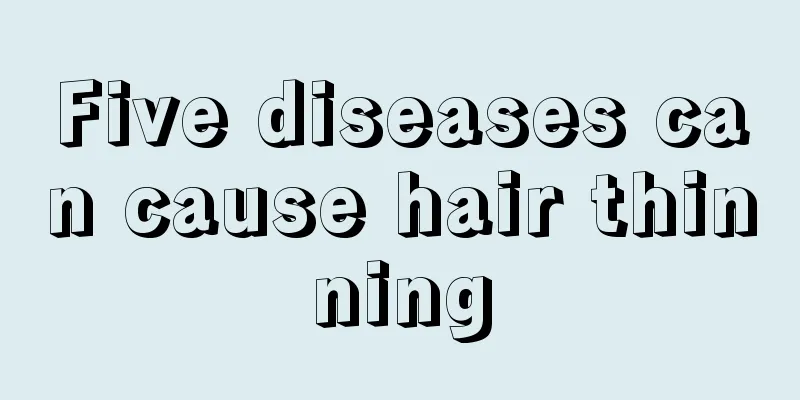Five diseases can cause hair thinning

|
Changes in hair directly reflect the internal health of the human body. Hair that loses its luster, becomes dry, brittle, split ends and thinning are all signs of health problems.
1. Anemia The body needs iron to help produce red blood cells, which carry oxygen throughout the body. Iron deficiency can lead to anemia, which results in a decrease in red blood cells. As a result, the amount of blood oxygen reaching the scalp also decreases, putting the hair follicles in a "hungry" state, eventually causing the hair to fall out slowly and the scalp to become increasingly visible. Iron supplementation can help improve symptoms of anemia. Lack of vitamin C, intake of caffeine or alcoholic beverages are not conducive to iron absorption. It is recommended to drink juice and eat iron-rich foods to restore hair growth.
2. Eating disorders Reducing food intake will lead to a decrease in blood flow to the scalp, which in turn affects the normal growth of hair. In severe cases, it can cause hair to lose its luster or even fall out. Hair loss is rarely permanent, but eating a balanced diet and consuming plenty of protein is key to preventing it. Hair is made of protein, and when hair follicle protein is at its lowest, it is particularly important to consume more protein (especially breakfast). In addition, the diet should be rich in vitamins (especially B vitamins), zinc and important fatty acids.
3. Polycystic ovary syndrome Polycystic ovary syndrome in women is caused by excessive levels of male hormones, and patients will experience symptoms of thinning hair on the forehead and top of the head. This situation mostly occurs in patients with a family history of hair loss. Patients lose hair on their heads, but hair grows wildly on their faces and bodies. Medications that lower male hormones and scalp massages to promote blood flow can help patients' hair grow back.
4. Thyroid disease The first symptom of thyroid dysfunction is hair loss. Too much or too little thyroid hormone can affect metabolism and normal hair growth. Since all hair follicles are affected, hair loss is not a localized phenomenon. Medicines and other treatments can help relieve the condition. In order to restore your hair to its original state, it is best to consume more protein and do a head massage every morning.
5. Stress syndrome Stress can cause premature graying of hair. When under stress, the human body releases a variety of hormones that will affect the absorption of B vitamins and affect hair pigmentation. Stress syndrome can lead to alopecia - the body's immune system mistakenly attacks scalp cells, causing large clumps of hair to fall out. Mental relaxation and taking vitamin B complex can improve the problem of premature gray hair. |
<<: Why do I lose my hair so much in summer
>>: Seven kinds of pain that require you to see a doctor immediately
Recommend
What are the symptoms of bladder cancer?
Bladder cancer is also a type of malignant tumor....
What causes pancreatic tumors? There are many causes.
Pancreatic adenocarcinoma is a common digestive m...
The formation process of urine
Eating, drinking, defecating and urinating are th...
Does black tea affect sleep?
We all know that if we drink a lot of tea when we...
What causes itchy lips and itchy edges?
If your lips are itchy and the edges of your lips...
Can a woman with colon cancer get pregnant?
Colon cancer is a common malignant tumor of the d...
How much does it cost to treat lymphoma in its early stages?
The early manifestation of lymphoma is swollen ly...
What are the symptoms of Helicobacter pylori infection
Helicobacter pylori is a common pathogen that oft...
How long can the air conditioner be turned on continuously
In the hot summer, fans cannot completely relieve...
How to quickly gain 20 pounds
For people with relatively thin physique, there i...
How to restore black gums to normal
Nowadays, oral problems have become a problem tha...
What is the appropriate temperature for air conditioning in summer
With the continuous advancement of science and te...
Summer cold recipes
I don’t know if you have ever experienced catchin...
How to choose jackfruit
How to choose jackfruit? My mother knows that jac...
For malignant thyroid tumors, surgical treatment is the most important
Malignant thyroid tumor is a common cancer. The i...









